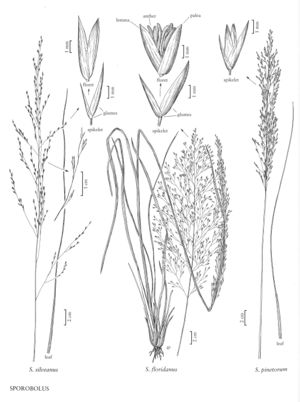Difference between revisions of "Sporobolus floridanus"
FNA>Volume Importer |
imported>Volume Importer |
||
| (8 intermediate revisions by 2 users not shown) | |||
| Line 4: | Line 4: | ||
|publications= | |publications= | ||
|common_names=Florida dropseed | |common_names=Florida dropseed | ||
| + | |special_status={{Treatment/ID/Special_status | ||
| + | |code=E | ||
| + | |label=Endemic | ||
| + | }} | ||
|basionyms= | |basionyms= | ||
|synonyms= | |synonyms= | ||
| Line 17: | Line 21: | ||
-->{{Treatment/Body | -->{{Treatment/Body | ||
|distribution=S.C.;Fla.;Ala.;Ga. | |distribution=S.C.;Fla.;Ala.;Ga. | ||
| − | |discussion=<p>Sporobolus floridanus grows in wet to mesic pine woodlands, seepage bogs, and treeless swales, in soils semi-permanently to seasonally saturated at the surface, and in places where water may pond for weeks, at elevations of 0-100 m. It is endemic to the southeastern United States.</p> | + | |discussion=<p><i>Sporobolus floridanus</i> grows in wet to mesic pine woodlands, seepage bogs, and treeless swales, in soils semi-permanently to seasonally saturated at the surface, and in places where water may pond for weeks, at elevations of 0-100 m. It is endemic to the southeastern United States.</p> |
|tables= | |tables= | ||
|references= | |references= | ||
| Line 26: | Line 30: | ||
-->{{#Taxon: | -->{{#Taxon: | ||
name=Sporobolus floridanus | name=Sporobolus floridanus | ||
| − | |||
|authority=Chapm. | |authority=Chapm. | ||
|rank=species | |rank=species | ||
| Line 33: | Line 36: | ||
|basionyms= | |basionyms= | ||
|family=Poaceae | |family=Poaceae | ||
| + | |illustrator=Linda A. Vorobik;Hana Pazdírková | ||
| + | |illustration copyright=Utah State University | ||
|distribution=S.C.;Fla.;Ala.;Ga. | |distribution=S.C.;Fla.;Ala.;Ga. | ||
|reference=None | |reference=None | ||
|publication title= | |publication title= | ||
|publication year= | |publication year= | ||
| − | |special status= | + | |special status=Endemic |
| − | |source xml=https:// | + | |source xml=https://bitbucket.org/aafc-mbb/fna-data-curation/src/200273ad09963decb8fc72550212de541d86569d/coarse_grained_fna_xml/V25/V25_694.xml |
|subfamily=Poaceae subfam. Chloridoideae | |subfamily=Poaceae subfam. Chloridoideae | ||
|tribe=Poaceae tribe Cynodonteae | |tribe=Poaceae tribe Cynodonteae | ||
Latest revision as of 17:58, 11 May 2021
Plants perennial; cespitose, not rhizomatous. Culms (40)100-200(250) cm. Sheaths shiny and indurate basally, glabrous or appressed hairy elsewhere, hairs to 5 mm; ligules 0.2-0.7 mm; blades (10)25-50 cm long, (2)3-10 mm wide, flat to folded, pale bluish-green, yellowing at maturity, glabrous on both surfaces or the adaxial surface sparsely hairy basally, margins scabridulous. Panicles (18)30-50 cm long, 4-15 cm wide, open (contracted when immature), longer than wide, not diffuse, pyramidal to ovate; lower nodes with 1-2(3) branches; primary branches 4-15 cm, spreading 10-90° from the rachis, not capillary, without spikelets on the lower 1/3; secondary branches spreading; pulvini hairy or glabrous; pedicels 2-14 mm, longer than the spikelets, spreading, glabrous, sometimes scabridulous. Spikelets (3.7)4-6 mm, purplish-brown. Glumes linear-lanceolate, membranous; lower glumes 2.5-5.1 mm, (0.6)0.75-0.9(0.94) times as long as the upper glumes; upper glumes 3.7-5.7 mm, longer than the florets; lemmas 3-4 mm, ovate to lanceolate, membranous, glabrous, acute; paleas 3-4 mm, ovate, membranous, glabrous; anthers 2-3.1 mm, purplish. Fruits 1.7-2 mm, fusiform, reddish-brown. 2n = unknown.
Distribution
S.C., Fla., Ala., Ga.
Discussion
Sporobolus floridanus grows in wet to mesic pine woodlands, seepage bogs, and treeless swales, in soils semi-permanently to seasonally saturated at the surface, and in places where water may pond for weeks, at elevations of 0-100 m. It is endemic to the southeastern United States.
Selected References
None.
